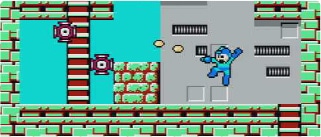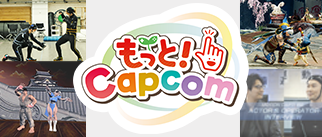Educational Support Activities | Program Contents
Program Content
Our program supports learning centered on the following two themes:
Career Education
What is work? – Games: from creation to distribution –
Learning about careers at a game company
Many children want to work in game development. In support of career education, this lesson introduces the role of game creator.
In this lesson, we introduce various roles within the game creation process, including game planners, sound creators, designers, and programmers, along with the role of advertising/promotion. In addition to talking about jobs, we explain how a career can be rewarding, enjoyable, and challenging. This lesson includes videos of our workplaces and interviews with Capcom employees.


| Target | Elementary (5th and 6th year) and junior high school students in Japan |
|---|---|
| Length of the program | Approximately 90 minutes *Upon request, it is possible to adjust the program to 50 minutes *We also offer a program that combines "Game Literacy Education" into a 90-minute session. |
| Program overview | ・The Making of a Game ・Jobs at Game Companies ・How to Do a Good Job ・Question & Answer Time |
| Text |
We use a presentation that follows the lesson program. |
| Terms and conditions | The program is available only in Japan |
| Methods of the program | On-site classes or company visits |
"Mathematics used on the job at Capcom"
Learning about how mathematics is used in working at a game company
Launched in April, 2013, this lesson introduces how arithmetic and mathematics are applied in the workplace of game companies. The content is designed to help students realize that what they are studying now is not a waste—it will be useful in their future careers.
In this program, we support career education and motivation building by having employees who work at our company solve problems based on the arithmetic and mathematics they actually use on the job, fostering familiarity with the subject matter via a game-book style resource titled The Workplace Guide to Arithmetic and Mathematics.


| Target | Elementary (5th and 6th year) and junior high school students in Japan |
|---|---|
| Length of the program |
Elementary students: 45 minutes Junior high school students: 50 minutes |
| Program overview | ・History of the Game Industry and Capcom ・Jobs at Game Companies ・Mathematics Used at Work ・Question & Answer Time |
| Text |
・We will provide the workbook: The Workplace Guide to Arithmetic and Mathematics |
| Terms and conditions | The program is available only in Japan |
| Methods of the program | On-site classes or company visits |
Goal of Career Education
This lesson introduces Capcom jobs and products, along with how the workers think about their jobs. Through this lesson, we hope that students can learn about why working at a game company is interesting and what rewards, enjoyment, and challenges come along with working in the game industry.
Most people think that working at game companies is all about game creation. However, there are many types of jobs at game companies. It is through the cooperation of these different roles and functions that we are able to create amazing game experiences.
In this lesson, we go beyond explaining jobs at Capcom, and show that within a company (and society) there are diverse people performing various jobs, each with their own motivations, working together toward a common goal. Through this cooperation, they create products that bring joy to many customers. By sharing this, we hope children realize that “their current life is connected to their future,” and provide an opportunity to develop a broader perspective on careers and the value of work.
Game Literacy Education
Thinking about the ideal way of enjoying games.
In this lesson, students learn about "game literacy". This knowledge better allows students to use video games properly based on their own decisions.
The lesson explains why games are fun and the differences between games and other forms of media and play. It also introduces tips such as ”how to get better at limiting play time while still having fun,” providing learning opportunities to develop practical game literacy.


| Target | Elementary (5th and 6th year) and junior high school students in Japan |
|---|---|
| Length of the program |
Approximately 90 minutes ※The lesson also includes “Career Education“. |
| Program overview | ・The Making of a Game (same as Career Education) ・Jobs at Game Companies (same as Career Education) ・Rethinking Game Time ・How to Limit Play Time and Have Fun ・Question & Answer Time |
| Text | We use a presentation that follows the lesson program. |
| Terms and conditions | The program is available only in Japan |
| Methods of the program | On-site classes or company visits |
Goals of Game Literacy Education
A "game" is something that creators and other employees at a game company pour their heart and soul into, striving to deliver joy to as many customers as possible. It is packed with ingenuity and creativity, mobilizing all their knowledge and technical skills to ensure players have fun.
However, becoming too absorbed in games can lead to losing track of time, causing life to revolve around gaming, or encouraging solitary play that reduces communication with friends and family. This must be avoided.
By sharing suggestions from our company as well as expert advice on topics such as setting appropriate play time within daily life and fostering communication with friends and family through games, we hope to help children learn how to manage their game play time wisely. We also aim to provide useful guidance for teachers and parents in supporting children’s balanced lifestyles.


